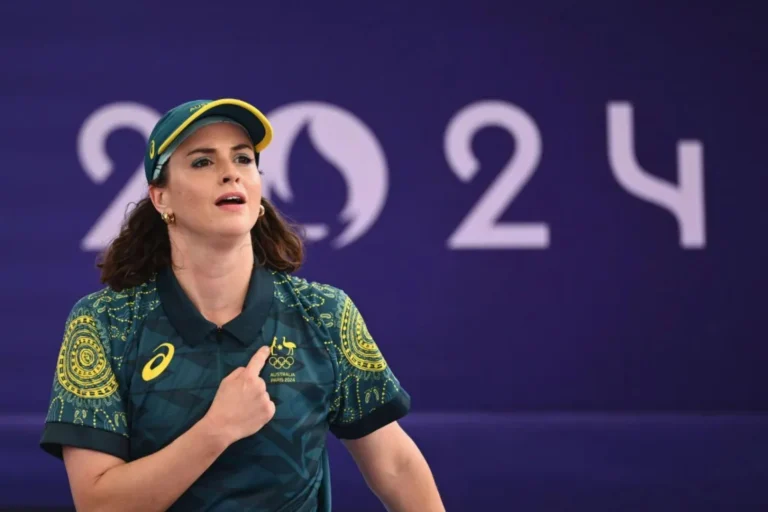Rachel Gunn, better known by her stage name Raygun, has achieved what few Australian athletes have ever managed—global fame that transcends sport and taps into the zeitgeist of the digital age. Her journey from a Melbourne street dancer to a viral sensation has made her one of the most talked-about figures of the 2024 Olympics, surpassing even Australia’s gold medallists in terms of marketability and earning potential. Raygun’s rise, fueled by millions of followers and celebrity endorsements, positions her to make more money from these Games than many gold medallists combined. But the path to this remarkable achievement is paved with more than just dance moves; it’s a narrative shaped by social media, celebrity culture, and the evolving dynamics of fame.
Viral Fame Backed by Numbers
Raygun’s explosive rise is backed by staggering statistics that underline her dominance in the digital arena. Her TikTok account boasts over 35 million followers, with individual videos racking up hundreds of millions of views. On Instagram, her follower count recently surpassed 20 million, and her YouTube channel, where she posts behind-the-scenes footage and longer dance routines, has garnered over 10 million subscribers.
These numbers are not just impressive—they’re lucrative. According to social media analytics firm Influencer Marketing Hub, Raygun’s potential earnings per sponsored post on Instagram are estimated to be around $75,000 to $100,000. On TikTok, that number could soar even higher, with estimates suggesting she could command up to $150,000 for a single branded video. Compare this to the average annual earnings of an Australian Olympic gold medallist, which, even with endorsements, often hover around $250,000 to $500,000. Raygun could potentially eclipse that with just a few posts during the Olympic season.
Celebrity Endorsements and Public Praise
The world’s fascination with Raygun isn’t limited to her fan base. Celebrities and influencers alike have taken to social media to express their admiration for the rap-dancing sensation. Notably, pop icon Lizzo praised Raygun on Instagram, calling her “the future of entertainment” and “an absolute powerhouse.” Dwayne “The Rock” Johnson tweeted about her, saying, “Raygun is a testament to what happens when talent meets hustle. Keep shining, superstar.” Even Elon Musk, known for his eclectic tweets, mentioned Raygun in a post, humorously suggesting that she might be “the one to finally make Mars cool.”
These endorsements are more than just words of praise—they’re a testament to Raygun’s influence and appeal across diverse demographics. When celebrities of this caliber publicly align themselves with Raygun, they’re not just elevating her status—they’re signaling to brands that she is a cultural force to be reckoned with.
The Olympic Champions Left in the Shadows
While Raygun’s star continues to rise, the contrast with Australia’s gold medallists from the 2024 Olympics is stark. Take, for example, swimmer Emma McKeon, who has added multiple golds to her already impressive Olympic resume. Despite her status as one of Australia’s most decorated Olympians, McKeon’s earnings potential pales in comparison to Raygun’s. While McKeon may secure endorsements from swimwear brands and health companies, her appeal remains largely within the sports industry—a niche, albeit prestigious, market.
Similarly, cyclist Matthew Glaetzer, who clinched gold in the men’s sprint, and diver Melissa Wu, who secured a gold medal in the 10m platform, are celebrated athletes within Australia. However, their international fame is limited, and so is their marketability beyond the realm of sport. They may sign deals with sports-related brands and appear in government campaigns promoting health and fitness, but they lack the broad, cross-industry appeal that Raygun commands.
The Marketing Value of Humor and Relatability
Raygun’s edge in the marketing world comes not just from her numbers but from her ability to engage with audiences on a level that few athletes can match. Her use of humor and relatability makes her an ideal ambassador for brands looking to connect with younger, digitally-savvy consumers. Whether it’s fast food chains like McDonald’s or Burger King, which thrive on viral, humorous advertising, or telcos like Vodafone and Optus, which seek to connect with consumers through lifestyle branding, Raygun offers something that traditional athletes cannot: a personality that feels authentic and accessible.
One example of this potential was seen during the Olympics when Raygun posted a series of humorous TikToks poking fun at Olympic sports she’d love to try. These videos, which garnered millions of views, were not just entertaining—they were a masterclass in subtle branding. Without ever directly mentioning a product, Raygun showcased the kind of content that brands dream of: engaging, shareable, and organically tied to her personality.
The Shelf Life of Viral Fame
Despite her current dominance, there’s a ticking clock on Raygun’s viral fame. The nature of internet stardom is fickle, and today’s sensation can quickly become tomorrow’s forgotten name. Advertisers are keenly aware of this and are rushing to capitalize on her fame while it’s still fresh. But the challenge for Raygun will be in sustaining her relevance. As she continues to sign deals and appear in campaigns, she’ll need to find ways to evolve her brand to avoid the fate of countless other viral stars who have faded into obscurity.
The long-term question is whether Raygun can transition from being a viral phenomenon to a lasting cultural icon. If she manages to do so, her earning potential could rival that of the world’s top entertainers. But if not, she may find that her shelf life as a marketing juggernaut is shorter than expected.
A New Paradigm in Olympic Marketing
Raygun’s overshadowing of Australia’s gold medallists is more than just a quirk of the 2024 Olympics—it’s indicative of a broader shift in the marketing landscape. Traditional athletes, even those who reach the pinnacle of their sports, are no longer guaranteed the lion’s share of endorsement deals. In an age where personality and online presence often outweigh physical achievement, the value proposition for brands is changing.
Athletes who wish to compete with the Rayguns of the world will need to adapt, embracing social media and cultivating their personal brands beyond the confines of their sports. Meanwhile, brands will need to reassess how they allocate their sponsorship budgets, balancing the prestige of aligning with Olympic champions against the widespread appeal of digital influencers.
The New Reality of Fame
Rachel Gunn, or Raygun, embodies a new reality in which digital fame can eclipse even the most hallowed achievements. While Australia’s gold medallists will return home as national heroes, their glory may be fleeting compared to the lasting impact Raygun is poised to make in the world of advertising and entertainment. Her journey from Melbourne’s streets to global stardom is a testament to the power of the internet and the evolving nature of celebrity in the 21st century.
In the end, Raygun’s story isn’t just about one woman’s ascent—it’s about the transformation of fame itself. As she continues to ride the wave of her viral success, the marketing world will be watching closely, ready to cash in on her meteoric rise while it lasts. Whether she can sustain that success is a question that only time will answer, but for now, one thing is clear: Raygun is winning gold where it counts—in the hearts, minds, and wallets of consumers worldwide.










Comments are closed.